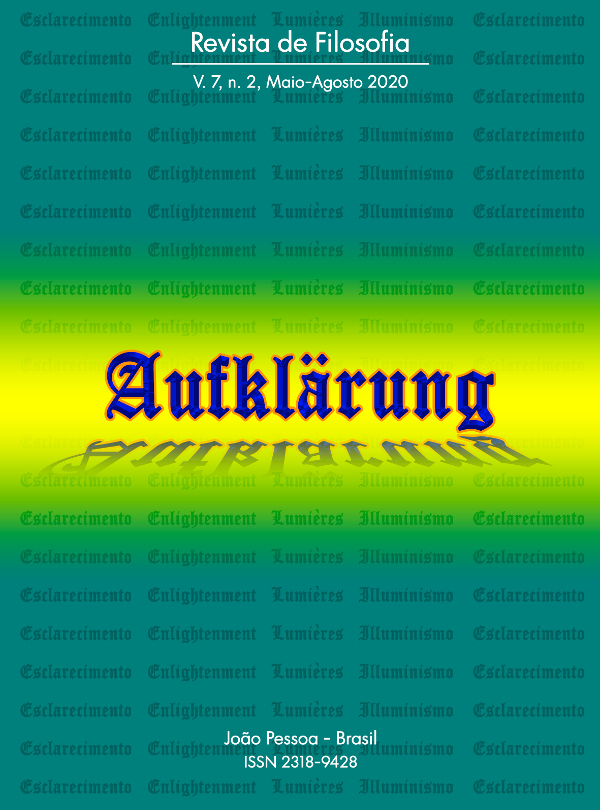The real interpretations of ‘if’ in academic texts: A study of the possibilities corresponding to the conditional in a psychology paper
DOI:
https://doi.org/10.18012/arf.v7i2.51801Keywords:
biconditional, conditional, if, interpretation, semantic possibilityAbstract
Johnson-Laird and Byrne proposed in 2002 that, beyond the two traditional interpretations that are assigned to if, that is, the material and the biconditional ones, eight more combinations of possibilities related to their meaning can be attributed to this kind of sentences. The initial hypothesis in the present study is that not all of those ten interpretations should be usual in academic texts, since some of them resort, for example, to figurative language or irony. In this way, a study of a psychology paper is carried out in order to check that hypothesis. The results are that, at least in that paper, the uses of if tend to be linked to the interpretation that both Johnson-Laird and Byrne and the literature in general relate to the biconditional.
Downloads
References
AUWERA, Johan van der. Pragmatics in the last quarter century: The case of conditional perfection. Journal of Pragmatics, 27, 261-274, 1997.
BOYATZIS, Rirchard E. Transforming Qualitative Information: Thematic Analysis and Code Development. Thousand Oaks, CA: Sage, 1998.
BUCCIARELLI, Monica; JOHNSON-LAIRD, Philip N. Deontics: Meaning, reasoning, and emotion. Materiali per una Storia della Cultura Guiridica, XLIX, 1, 89-112, 2019.
EFRAT EFRON, Sara; RAVID, Ruth. Action Research in Education: A Practical Guide. New York, NY: The Guilford Press, 2013.
GEIS, Michael L.; ZWICKY, Arnold M. On invited inferences. Linguistic Inquiry, 2, 561-566, 1971.
JOHNSON-LAIRD, Philip N.; BYRNE, Ruth M. J. Conditionals: A theory of meaning, pragmatics, and inference. Psychological Review, 109, 4, 646-678, 2002.
KHEMLANI, Sangeet; BYRNE, Ruth M. J.; JOHNSON-LAIRD, Philip N. Facts and possibilities: A model-based theory of sentential reasoning. Cognitive Science, 42, 6, 1887-1924, 2018.
KHEMLANI, Sangeet; HINTERECKER, Thomas; JOHNSON-LAIRD, Philip N. The provenance of modal inference. In: GUNZELMANN, Glenn; HOWES, Andrew; TENBRINK, Thora; DAVELAAR Eddy J. Proceedings of the 39th Annual Conference of the Cognitive Science Society. Austin, TX: Cognitive Science Society, 2017. 259-264.
KHEMLANI, Sangeet; JOHNSON-LAIRD, Philip N. Why machines don’t (yet) reason like people. Künstliche Intelligenz, 33, 219-228, 2019.
LÓPEZ-ASTORGA, Miguel. Logic, pragmatics, and types of conditionals. Frontiers of Philosophy in China, 11, 2, 279-297, 2016.
MOLDOVAN, Andrei. Pragmatic considerations in the interpretation of denying the antecedent. Informal Logic, 29, 3, 309-326, 2009.
OAKHILL, Jane; GARNHAM, Alan (Eds.). Mental Models in Cognitive Science. Essays in Honour of Phil Johnson-Laird. Hove, UK: Psychology Press, 1996.
ORENES, Isabel; JOHNSON-LAIRD, Philip N. Logic, models, and paradoxical inferences. Mind & Language, 27, 4, 357-377, 2012.
QUELHAS, Ana Cristina; JOHNSON-LAIRD, Philip N. The modulation of disjunctive assertions. The Quarterly Journal of Experimental Psychology, 70, 4, 703-717, 2017.
QUELHAS, Ana Cristina; RASGA, Célia; JOHNSON-LAIRD, Philip N. A priori true and false conditionals. Cognitive Science, 41, 55, 1003-1030, 2017.
QUELHAS, Ana Cristina; RASGA, Célia; JOHNSON-LAIRD, Philip N. The analytic truth and falsity of disjunctions. Cognitive Science, 43, 9, 2019. DOI: https://doi.org/10.1111/cogs.12739.
RUTHERFORD, M. D.; RAY, Darrien. Cheater detection is preserved in autism spectrum disorders. Journal of Social, Evolutionary, and Cultural Psychology, 3, 2, 105-117, 2009.
WASON, Peter C. Reasoning. In: FOSS, Brian. New Horizons in Psychology. Harmondsworth (Middlesex), UK: Penguin, 1966. 135-151.
WASON, Peter C. Reasoning about a rule. Quarterly Journal of Experimental Psychology, 20, 273-281, 1968.
Additional Files
Published
How to Cite
Issue
Section
License
Journal general policy
1.This journal works under a Creative Commons License aplied to online journals. That icence can be read in the following link: Creative Commons Attribution 4.0 International (CC BY 4.0).
2.Accordingly to this License, a)the journal declares that authors hold the copyright of their articles without restrictions, and they can archieve them as post-print elsewhere. b)the journal allow the author(s) to retain publishing rights without restrictions.
Metadata Policy for information describing items in the repository
1. Anyone may access the metadata free of charge at anytime.
2.The metadata may be re-used in any medium without prior permission, even commercial purposes provided the OAI Identifier or a link to the original metadata record are given, under the terms of a CC BY license refered for the Journal.







































